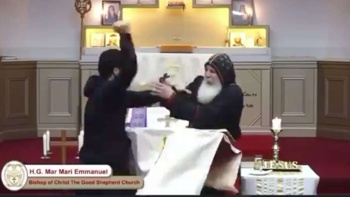In a victim impact statement, Roper described watching over her mother in the critical care unit as she struggled to breath.
"The woman she had been - fastidious, hardworking and proud - was already gone."
Just days before she had spoken to her mother about her relationship with Everett.
It was a conversation she would replay over and over again in her mind, wondering if she could have changed things.
Her son had been robbed of a grandmother "because someone else decided her life was worthless".
In another victim impact statement the court heard how Hart's younger daughter Hannah Hart still had nightmares about walking up to the flat after her mother's death.
She described her mother as a "happy, good-humoured" little lady with a big heart and said she could not imagine how frightened she would have been.
Hart would be sorely missed by her entire family, she said.
"My two boys will grow up without their granny."
Hart's mother Beverley, stepfather Len, brother Brendon and niece Arabella all shared a victim impact statement.
The court heard how they had suffered huge amounts of anxiety in the lead up to the trial, all at times resorting to taking sleeping pills.
Some of that anxiety was triggered by the idea that Everett might not be convicted for Hart's death.
They called the whole affair the "worst experience of our lives".
On February 21, a jury found Everett guilty of manslaughter by assault.
Today, Justice Pheroze Jagose sentenced Everett to seven years and six months in prison with a minium non-parole period of three years and nine months.
Jagose said the pair were both alcoholics and that Hart was often incapacitated by this - she even depended on Everett to bring her food.
After she suffered the brain bleed, Everett had never inquired about Hart despite being told her condition was life threatening, Justice Jagose said.
He showed little to no regard for her condition, he said.
"Your primary concern was to explain how you were affected by your relationship with Ms Hart."
In the days and weeks leading up to her death, Everett had told his landlord Kenneth Rush that she was "worthless", Justice Jagose said.
He had also said he hoped "she'd drop dead" and that she was "a waste of space".
In the police interview Everett revealed that the relationship was "extremely frustrating" and described it as being like "living with a dog that continues to bark".
When the other landlord Louise Travis tried to help Hart, Everett had delayed her.
"You said to give it an hour or so; that Ms Hart would be okay," Justice Jagose said.
"Ms Travis said she did not think Ms Hart even had five minutes.
"You repeatedly said, 'If she dies, she dies'."
Everett then tried to delay Travis leaving the flat.
Justice Jagose said the anxiety Hart's family members suffered during and leading up to the trial had been necessitated by his not guilty plea.
"Both daughters emphasise those devastating effects not only for themselves, and the guilt they feel for not intervening earlier, but also for the next generation of their families, who will be without their grandmother."
The aggravating features included the fact Hart had died, that her head had been attacked, and she was vulnerable, Justice Jagose said.
There were no mitigating factors, he said.










